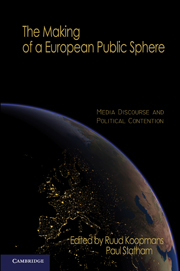10 - Political Party Contestation
Emerging Euroscepticism or a Normalization of Eurocriticism?
Published online by Cambridge University Press: 05 June 2012
Summary
Introduction
It is well known that party contestation over European integration and the European Union produces strange bedfellows, bringing together those who, as one activist candidly put it, “would not want to be seen dead in the same coffin” (Forster 2002, p. 60). Criticisms of Europe often come from the left and right poles, whereas center parties suspend normal hostilities advocating a generally pro-European line. At face value, this suggests that party behavior over Europe is exceptional and atypical. Over the past decade, however, the form and meaning of this relationship between party alignments over Europe and traditional ones, especially the left–right cleavage, and its consequences for party politics have become disputed. Questions arise over whether Europe is business as usual or transformative for party politics. For some, party contestation over Europe remains largely issue specific, with few “spillover” effects and limited impacts for national party politics (see, especially, Mair 2000b). For others, it constitutes part of an emerging cleavage, in the Rokkanian sense, that is transforming the political space in Western Europe (see, especially, Kriesi 2005, 2007; Kriesi et al. 2006b, 2008). Still others have made influential contributions standing between these poles. This controversy has brought a renewed interest in questions about political parties' stances over Europe, and especially their critical ones: Is party contestation over Europe increasing? Is Euroscepticism on the rise? Does criticism of Europe come from the core or periphery, or from the left or right?
- Type
- Chapter
- Information
- The Making of a European Public SphereMedia Discourse and Political Contention, pp. 245 - 274Publisher: Cambridge University PressPrint publication year: 2010
- 15
- Cited by



